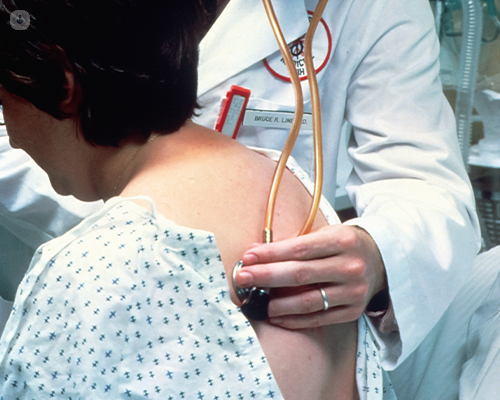Shortness of breath: should I worry?
Written by:Regular daily activities can cause us to get short of breath. However, if we experience too much shortness of breath, this can be concerning and could be the indication of something more serious.
Highly experienced consultant cardiologist Dr Francesco Lo Giudice, part of the national pulmonary hypertension service team at Hammersmith Hospital, describes in this article what doctors look for in a patient experiencing shortness of breath and what it could mean.

When is shortness of breath considered a serious, worrying condition?
Shortness of breath is a very non-specific and generic symptom or complaint; it could be related to several reasons. What becomes a reason of alarm in general is when the shortness of breath is something new that the patient has never experienced before, which is really affecting or changing daily life.
When the patients are referred to our service, it is because there is some concern of heart disease or lung disease, most of the time after an echocardiogram.
The first thing we do is trying to understand the degree of symptoms and when these started - is it something lasting a few years or is it something that they noticed very recently, in the last six or twelve months for example, or an even shorter time.
The second point is how it changes their life— do they get shortness of breath during the usual daily activities, such as climbing one flight of stairs at home or even having a shower, or when they push slightly harder as walking uphill, gardening, playing sports? Have they noticed that now they have to stop due to the shortness of breath?
Another important point is to understand if the patient also has other symptoms, such as chest pain or fainting episodes, and assessing the patient’s overall risk of having a heart or lung problem.
In general, we look for a history of:
- high blood pressure or high cholesterol
- diabetes
- obesity
- family history of heart disease or stroke
- smoking
But also:
- lung disease, like asthma or emphysema; frequent chest infections
- professional exposure to gas, chemicals, asbestos
- episodes of Raynaud’s phenomenon (the hands becoming pale and then red with cold), puffy hands, joint pain, fingertip ulcers, rashes especially on the cheeks
- previous clots in the legs or lungs
- previous surgery to remove the spleen
- miscarriages
The following step is the physical examination and we look for signs of heart failure, e.g. swelling of the legs, thighs or of the lumbar region, especially if associated with a rapid weight increase. We also look for signs of diseases affecting the joints or skin (so called autoimmune or connective tissue diseases), or for signs of a previous vein thrombosis. If we believe the symptoms are significant or we find specific signs, we then propose further investigations.
How is shortness of breath treated? Can it cause heart failure?
Shortness of breath could be one of the symptoms of heart failure, due to a problem of the left or the right side of the heart. The failing of the right side of heart it is often more difficult to identify early and when clear symptoms are present, the disease is at an advanced stage. This is why it is important to act quickly. When the right side of the heart is not able to cope with the demand, the patient starts to have worsening shortness of breath, often with swelling of the legs, increased weight, and the kidney and liver stop working properly. The patient needs diuretic therapy (water tablets) to keep this fluid retention low and most of the time the patient feels better, but it is important to identify the cause of the heart failure.
Is shortness of breath a sign of any other worrying condition?
Shortness of breath could be a sign of a lot of conditions. Sometimes, it needs to be addressed very quickly; for example, if the patient has sudden, severe shortness of breath, especially with chest pain or a faint, the cause could be a clot in the lungs. It is important to go to the A&E where they will do some blood tests, a CT scan and other tests, and eventually start immediate treatment with blood thinners or more aggressive therapies.
Other conditions related with shortness of breath are:
- smoking
- acute or chronic lung diseases
- ischaemic heart disease (problem of blood flow to the heart), especially in diabetic patients where shortness of breath can be an equivalent of angina (the typical chest pain during a heart attack)
- anaemia or other haematological conditions
- obesity
- poor physical activity and deconditioning
We have to consider all these possible causes with the proper investigations and eventually treat accordingly.
If you have noticed you have more shortness of breath recently or would like more information, you can book a consultation at Dr Lo Giudice's profile.


